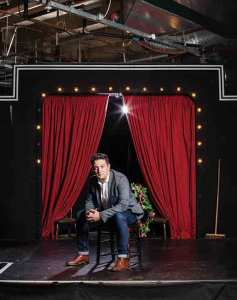 There can be no underestimating the randomness of theatrical paraphernalia. A tangle of old chairs here, a plastic garland of pink roses there. A giant, green bucket balanced on a small, wooden table next to a vintage free-standing lamp. At the end of a long corridor, and, far enough away that you think you have made a mistake until you get close enough to see it clearly, a coat stand with the oversized head of a bear costume spiked on top.
There can be no underestimating the randomness of theatrical paraphernalia. A tangle of old chairs here, a plastic garland of pink roses there. A giant, green bucket balanced on a small, wooden table next to a vintage free-standing lamp. At the end of a long corridor, and, far enough away that you think you have made a mistake until you get close enough to see it clearly, a coat stand with the oversized head of a bear costume spiked on top.
Welcome to 119 Farringdon Road, EC1. Formerly known as The Guardian Building, this was once one of the best-known media hubs in London. The journalists decamped in 2008 to their new King’s Cross site and the old premises lay empty for nearly six years. Until last September.
Enter Theatre Delicatessen, a company which collaborates with property developers to make use of empty buildings by turning them into pop-up theatre hubs. And real estate companies ready to write it off as a creative charity case should think again.
“Let’s make the maths easy,” says Theatre Delicatessen founder and artistic director Roland Smith. “For an 84,000 sq ft building in central London, the rental value is in the region of £1m a year. Councils are obliged to give charities an 80% discount on business rates. We are a charity. By giving us a short-term lease we can, and do, pass those savings on to the developer.”
Here is a man who knows how to get the property sector on side. And one who has no qualms trading off the commerciality of arts and culture to do so: “I am a cultural entrepreneur,” he says. “That is how I see myself. This whole idea of luvvies against capitalism? It is not real.”
Sitting on a half-constructed set in what was once a newsroom, Smith reveals how creatives and property developers are not as different as they might think and explains why the growth of immersive theatre means that empty buildings have never been more popular as performance spaces.
From conception to curtain up
Theatre Delicatessen has put on more than 100 performances across six venues in London and Sheffield since it was set up in 2007. It has worked closely with the likes of the Howard De Walden Estate, The Property Merchant Group, and Welbeck Land and will usually go into a building for 18 months to three years.
Over the past four years, the company has conceived, created and managed performance spaces in a derelict college building between Selfridges and St Christopher’s Place on the fringes of Oxford Street, a disused workshop at 295 Regent Street, and the former BBC London studios at 35 Marylebone High Street, all W1, to name a few.
Most of the premises the company uses, like 119 Farringdon Road, are empty because of development hold-ups or planning issues. In a building this size, Theatre Delicatessen can bring up to 400 people into the hub. Because these are not just spaces used to put on final performances, they provide areas for rehearsals, makeshift offices for theatre start-ups and writers and a base for early stage work, such as set and costume design.
During the time the company is set up in the building, these properties become creative communities.
There are performances of course. And some highly acclaimed ones. Over the years Theatre Delicatessen has staged Pedal Pusher, the Time Out Critics’ Choice Best of the Year 2009 and was nominated for best production and best entertainment in the Off West End Theatre Awards 2010 for Theatre Souk.
The creative successes are clear to see. But what about the benefits for developers and building owners?
The main driver behind Smith’s success has been setting these out clearly. There are the financial
gains, mainly passing on the business rates saving, as well as the non-financial perks – the fact there is someone in the premises keeping an eye on them and the PR that comes from being associated with such a fast-growing, immersive theatre company.
A prime example is the growing debate – covered in Time Out and Stylist magazines – around where the hotly anticipated Twin Peaks pop-up performance and diner will be held when the secret location is revealed. Three guesses…
When two worlds collide…
As to whether he sees a future in the model of putting on performances in empty buildings, Smith says that changing attitudes on the business side, as well as a move towards a different genre of performance art, stand it in good stead.
Smith insists that this is not just a case of him being able to demonstrate the commerciality of collaborations between creatives and developers. More that there is a natural shift occurring and that the time for the two worlds to collide has come: “Theatre makers see spaces and our imaginations run riot. We see opportunity, and we try to realise that,” he says. “That is kind of the same thing with property developers. We might have different motivators but when it comes to empty spaces they want to realise the opportunity too. And we see them as collaborators. We see them as people can work with.”
Then there is the growing popularity of immersive theatre – the genre at the heart a Theatre Delicatessen’s model and what type these buildings lend themselves to so well. And if anyone remains unconvinced of this craze he points to Secret Cinema, which is charging £78 a ticket for the new Star Wars immersive experience: “Its average weekend gross? £260,000,” he says, shaking his head at the enormity of the figure. And with a total of 100 play dates, this Star Wars event alone could be on course for a total gross of £6.7m.
“What you have now is an audience base who expect that immersion, who expect to step into a different world as part of their cultural offer,” he says.
“The experience economy is driving immersive theatre to the point where it is actually coming right into the mainstream. Luckily, by using abandoned buildings or empty buildings, this is exactly what we can offer.”
The problems of a pop-up
That is not to say there are not challenges: “It is a flawed model,” says Smith. “It is skewed towards central London and all of our funding comes from the buildings. After a certain amount of time we are usually on a month-by-month rolling basis. When they give us our notice and we have not found another building, that’s it, over. It relies on a pop-up model and that is problematic. The other problem is that councils take quite a hit giving us the rates reduction so we always need to prove to them that we are using the whole of the building for charitable use. And no one is quite sure how you define that. And obviously business rates are under review.”
So what is the answer? “Ultimately we want to do what we do on a cost mutual basis in the future,” says Smith. “We want to be able to just find an empty building and have a business model in place that we can go and just start work and not rely on handouts. And I think to do that we would have to work with councils under Section 106 creative workspace agreements. So we are looking for more permanent premises where we would be based for the management of the company, the conceiving of ideas and some of the early stage works.
“And then we would continue doing the performances themselves as pop-ups in other empty premises like we do now.
“We would always want to be working in this pop-up form for performances.”
For now, Theatre Delicatessen – and that oversized bear head – are happily ensconced in one of Clerkenwell’s best-known buildings. No one knows for how long but if you are on the hunt for that Twin Peaks diner, you might want to swing by before the end of September. Just saying…
Fancy a spot of immersive theatre this summer?
Check these out…
Utopia
Roundhouse, Chalk Farm, NW1
Until Saturday 22 August
Alice’s Adventures Underground
The Vaults, Southbank, SE1
Until Sunday 30 August
Heartbreak Hotel
The Jetty, Tower Hamlets, SE10
Until Sunday 27 September
dreamspeakthink: Absent
Shoreditch Town Hall,
Old Street, EC1
Until Sunday 25 October











